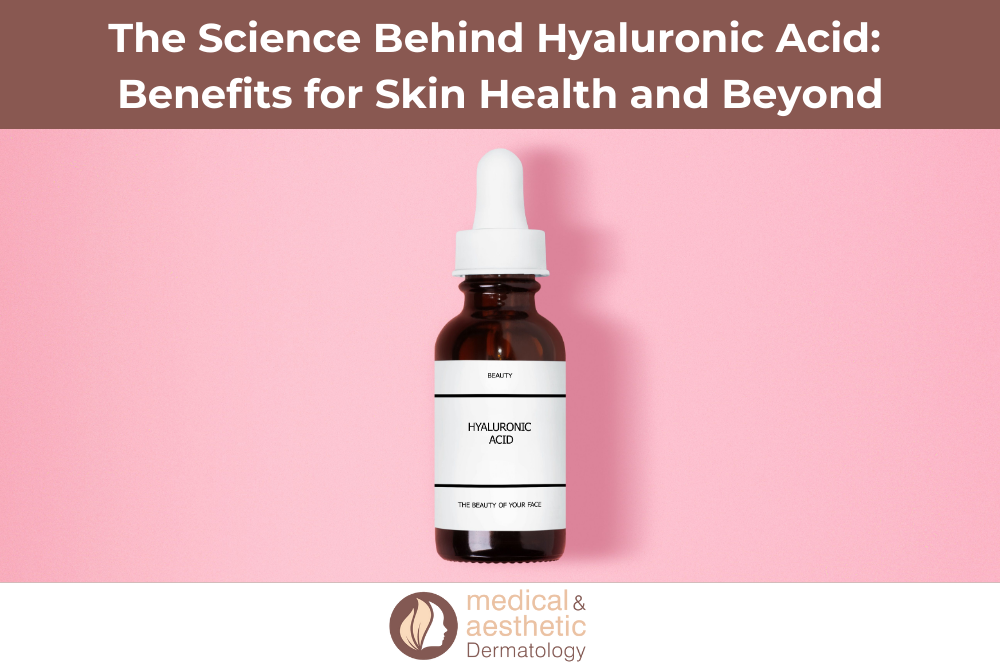 Hyaluronic acid (HA) has become a buzzword in the world of skincare and dermatology, praised for its remarkable ability to hydrate and rejuvenate the skin. But what exactly is hyaluronic acid, and why is it so effective? In this blog post, we’ll dive into the science behind hyaluronic acid, explore its benefits, and provide practical tips for incorporating it into your skincare routine.
Hyaluronic acid (HA) has become a buzzword in the world of skincare and dermatology, praised for its remarkable ability to hydrate and rejuvenate the skin. But what exactly is hyaluronic acid, and why is it so effective? In this blog post, we’ll dive into the science behind hyaluronic acid, explore its benefits, and provide practical tips for incorporating it into your skincare routine.
What is Hyaluronic Acid?
Hyaluronic acid is a naturally occurring glycosaminoglycan—a type of molecule made up of sugars—that is found in connective tissues throughout the body. It plays a critical role in retaining moisture, cushioning joints, and supporting the structure of the skin.
The key feature of hyaluronic acid is its exceptional ability to hold water—up to 1,000 times its weight. This property makes it indispensable for maintaining skin hydration and elasticity.
How Does Hyaluronic Acid Work in the Skin?
The skin’s dermis contains significant amounts of hyaluronic acid, which helps keep the skin supple and plump. However, natural levels of hyaluronic acid decrease as we age, leading to dryness, fine lines, and wrinkles. By applying hyaluronic acid topically or using injectable fillers, the skin’s moisture levels can be replenished, resulting in smoother, firmer, and more youthful-looking skin.
Benefits of Hyaluronic Acid for Skin
- Deep Hydration:
Hyaluronic acid attracts moisture from the environment and binds it to the skin, providing long-lasting hydration. This makes it especially beneficial for dry or dehydrated skin. - Anti-Aging Properties:
By improving hydration, hyaluronic acid reduces the appearance of fine lines and wrinkles, giving the skin a smoother and more youthful appearance. - Enhanced Skin Barrier:
A strong skin barrier is crucial for protecting against environmental aggressors like pollution and UV damage. Hyaluronic acid helps strengthen this barrier. - Improved Elasticity:
With consistent use, hyaluronic acid can boost the skin’s elasticity, making it more resilient and less prone to sagging. - Compatibility with All Skin Types:
Hyaluronic acid is gentle and non-comedogenic, meaning it won’t clog pores. It’s suitable for sensitive, acne-prone, and even oily skin types.
How is Hyaluronic Acid Used in Dermatology?
Topical Applications
Hyaluronic acid serums and moisturizers are widely available and can be easily incorporated into daily skincare routines. Look for products with a high concentration of HA for maximum effectiveness.
Injectable Fillers
Dermatologists and aesthetic practitioners use hyaluronic acid-based dermal fillers to restore volume, smooth wrinkles, and enhance facial contours. Popular brands include Juvederm® and Restylane®.
Combination Therapies
Hyaluronic acid is often combined with other skincare treatments, such as microneedling or laser resurfacing, to optimize hydration and healing.
Comprehensive Q&A Section
Q: Is hyaluronic acid safe for everyday use?
A: Yes, hyaluronic acid is safe and effective for daily use in most topical formulations. However, it’s always a good idea to patch-test new products and consult a dermatologist if you have sensitive skin.
Q: Can hyaluronic acid be used with other active ingredients?
A: Absolutely! Hyaluronic acid pairs well with ingredients like vitamin C, retinol, and peptides. It acts as a hydration booster, enhancing the effectiveness of these ingredients without causing irritation.
Q: How do hyaluronic acid injections differ from topical products?
A: Topical hyaluronic acid hydrates the skin’s surface, while injectable fillers target deeper layers to restore lost volume and contour. The choice depends on your specific skincare needs and goals.
Q: Are there any side effects of hyaluronic acid fillers?
A: Hyaluronic acid fillers are generally safe when administered by a qualified professional. Temporary side effects may include mild swelling, redness, or bruising at the injection site.
Q: How can I maximize the benefits of hyaluronic acid?
A: For topical use, apply hyaluronic acid on damp skin to help lock in moisture. Pair it with a good moisturizer to seal hydration and use sunscreen to protect your skin.
Why Choose Medical & Aesthetic Dermatology for Your Skincare Needs?
At Medical & Aesthetic Dermatology, we are dedicated to helping you achieve healthy, radiant skin through advanced dermatological treatments. Our experienced team specializes in personalized skincare solutions, including hyaluronic acid-based therapies. Whether you’re seeking a professional-grade hydrating treatment or exploring dermal fillers, we’re here to guide you every step of the way.
Contact Us Today
Take the first step toward glowing, hydrated skin with hyaluronic acid treatments at Medical & Aesthetic Dermatology.
📍 Address: 9256 Bendix Road, Suite 200A, Columbia, MD 21045
📞 Phone: (443) 542-0505
Schedule your consultation today to discover how hyaluronic acid can transform your skin!

